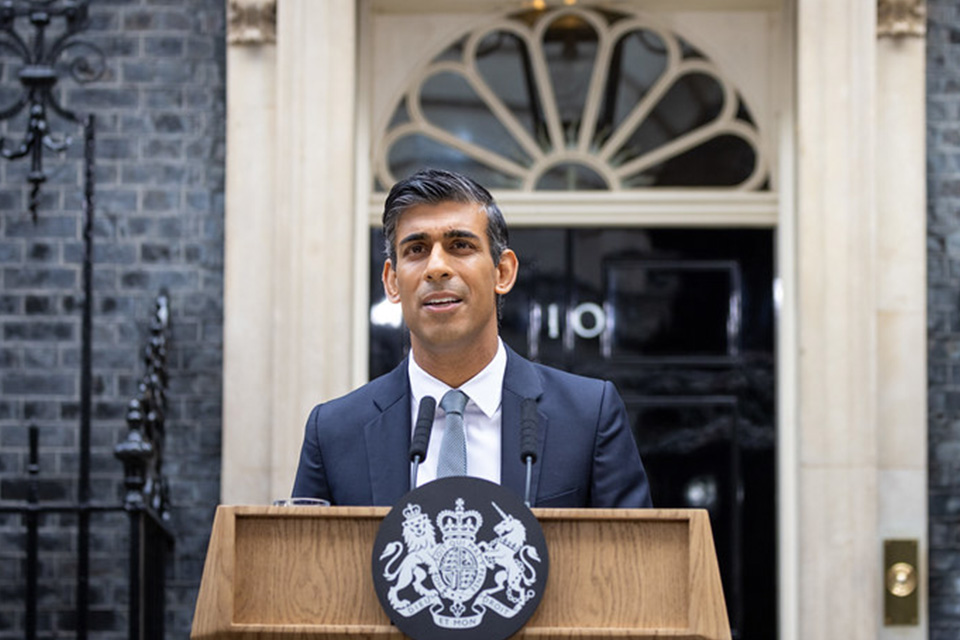

Prime Minister Rishi Sunak announced on Thursday 7 December 2023 plans to introduce to the parliament, a Bill to conclusively deem Rwanda a safe country notwithstanding UK and international law and end the merry-go-round of illegal migration delay tactics by migrants.
The Bill is the toughest immigration legislation ever introduced to Parliament. It includes provisions to disapply relevant sections of the Human Rights Act, unambiguously exclude the courts from challenging the fact that Rwanda is safe, and confirm that ministers alone can decide whether to comply with blocking orders from Strasbourg, like the one that grounded the first Rwanda flight in 2022.
The new Safety of Rwanda (Asylum and Immigration) Bill builds on the Treaty signed by the Home Secretary and Rwandan Foreign Affairs Minister, Dr Vincent Biruta, and makes clear in UK law that Rwanda is a safe country for asylum seekers, answering all of the concerns of the Supreme Court.
The legislation and Treaty deliver on the Prime Minister’s priority to stop the boats and ensure that people know that if they come to the UK illegally, they will not be able to stay.
Once the Bill receives Royal Assent, it will pave the way for the UK to begin next steps in processing people for relocation and starting removal flights to Rwanda.
The Government intends to fast-track the emergency legislation through the House as soon as possible.
Underpinned by the Treaty, the law will prevent UK courts and tribunals from delaying or preventing a person’s removal to Rwanda, on the grounds that they are at risk of being removed to an unsafe country.
The Bill will also make clear that the UK Parliament is sovereign, and the validity of any Act of Parliament is unaffected by international law. Ministers will retain the decision on whether or not to comply with interim measures from the European Court of Human Rights.
It also makes clear the extremely limited exceptions which individuals could challenge removal to Rwanda, and the exceptions, which narrow this to the maximum, allowed within the law. This includes preventing UK courts and tribunals from granting interim measures, apart from when a person can produce compelling evidence – as a result of their specific personal circumstances – that would lead to them facing a real, imminent and foreseeable risk of serious and irreversible harm if removed to Rwanda. In addition, it disapplies elements of the Human Rights Act 1998, meaning they cannot be factored into court or tribunal decision making.
Prime Minister Rishi Sunak said: “I have been unequivocal that we can no longer tolerate the endless scourge of illegal migration on our country. It is costing us billions of pounds and costing innocent lives, and that is why we are taking action to put a stop to it and make clear once and for all that it is Parliament that should decide who comes to this country, not criminal gangs.
“Through this new landmark emergency legislation, we will control our borders, deter people taking perilous journeys across the channel and end the continuous legal challenges filling our courts.
“And we will disapply sections of the Human Rights Act from the key parts of the Bill, specifically in the case of Rwanda, to ensure our plan cannot be stopped.
“We have acted quickly to remedy the issues raised by the Supreme Court, proving that Rwanda is not just a safe country, but a modern, prosperous nation, and today we are ending the tactics used by people to cheat the system and betray the British people.
“My message to the vicious people smugglers is clear, there is no point in ruining people’s lives any longer, if an individual comes here illegally, they will be removed.”
The Prime Minister Rishi Sunak said, “Claiming asylum – that’s now blocked. Abuse of our Modern Slavery rules – blocked. The idea that Rwanda isn’t safe – blocked.
The risk of being sent on to some other country – blocked. And spurious Human Rights claims – you’d better believe we’ve blocked those too, because we’re completely disapplying all the relevant sections of the Human Rights Act.
And not only have we blocked all these ways illegal migrants will try and stay. We’ve also blocked their ability to try and stay by bringing a Judicial Review on any of those grounds.
That means that this Bill blocks every single reason that has ever been used to prevent flights to Rwanda from taking off.”
Home Secretary James Cleverly, said: “We are taking crucial steps forward to respond to the Supreme Court’s findings, which recognised that changes could be delivered to make this landmark partnership work.
“Building on our legally binding Treaty, the Safety of Rwanda Bill will make absolutely clear in UK law that Rwanda is a safe country.
“This will play a key part in our efforts to stop the boats and save lives – I would urge parliament to ensure the legislation is passed as soon as possible.
“Rwanda is a country that cares deeply about supporting refugees. It stands ready to welcome those relocated there.”
The Bill also further reflects the strength of the Government of Rwanda’s protections and commitments given to people transferred to Rwanda, as committed to in the Treaty.
The principle of relocating people to another country to have their asylum claims processed is lawful – the High Court confirmed this, and it was upheld by the Court of Appeal and the Supreme Court, which did not disturb that finding.
Countries across Europe are following the United Kingdom’s lead in exploring third country models for illegal immigration – including Austria, Germany, Denmark, and Italy in their deal with Albania.
Rwanda currently hosts more than 135,000 people seeking safety and protection and has a track record of providing that protection and supporting people in thriving in their country. The UN Refugee Agency has its own scheme for refugees in Rwanda, which is not delivered through a legally binding Treaty.
On Tuesday the Home Secretary was in Rwanda to sign the Treaty with his counterpart, Minister for Foreign Affairs Dr Vincent Biruta.
The document is binding in international law and is currently going through the Parliamentary ratification process.








